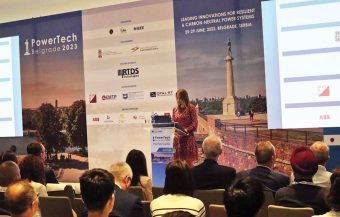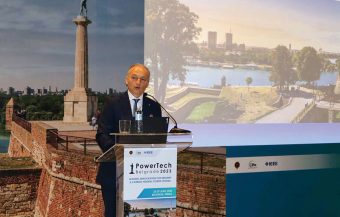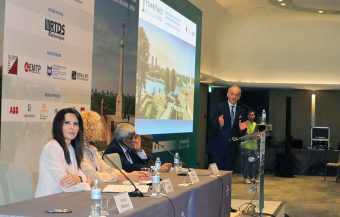
The fifteenth consecutive international conference IEEE PES PowerTech Belgrade 2023, held in Belgrade in late June, gathered around 600 participants—academic lecturers, well-known researchers in the field of power engineering, managers, and leaders of research activities in corporations, professors and young people and students from close to 50 countries. This was the largest conference organized in the last 30 years by the Power & Energy Society, the power engineering section of the American Association of Electrical and Electronics Engineering (IEEE) outside the United States, in cooperation with local organizers, which this year took place in cooperation with the Faculty of Electrical Engineering in Belgrade. IEEE PES PowerTech is considered one of the most important global meetings in Europe’s energy segment. IEEE PES PowerTech Belgrade 2023 is the largest and most significant international power engineering conference ever held in the territory of the former Yugoslavia. The main topics of the conference included power supply security, changes in the power system caused by the increased connection of renewable energy sources (RES) to power grids, the need to boost the system’s resistance to major climate changes, the transition to a power system that will not emit harmful greenhouse gases, the integration of electric cars and the management of energy consumption, that is, how to get small and large consumers to plan their consumption with the view of reducing energy use. Over 400 scientific and professional papers were presented at the conference. In an interview for our magazine, Professor Jovica Milanović, Dean of the Department of Electrical Engineering and Electronics at the University of Manchester in Great Britain, foreign member of the Serbian Academy of Engineering Sciences and honorary co-chairman of the conference, pointed out that the greatest benefit of the meeting in Belgrade for our country was that Europe and the world could see that Belgrade is still mindful of power engineering and that the results accomplished by our teachers, researchers, engineers and students in this field deserve in every way the greater involvement of our universities and research institutions in international research and projects funded by EU and other international organizations.
IN FOCUS:
- CHARGE&GO CONTINUES TO BUILD A NETWORK OF CHARGER
- NOVI SAD STEPS INTO THE WORLD OF ELECTROMOBILITY
- ENERGY REHABILITATION CONTRIBUTES TO ENERGY SAVING AND ENVIRONMENTAL PROTECTION

Q. How would you rate the conference?
A. This kind of conference has never been held on the ex-Yugoslavia territory, neither in size nor importance. It is one of the most important professional meetings in the field of energy in the world, which is not industrially oriented. My foreign colleagues and I were surprised by the quality of the participants. PES has around 40,000 members worldwide. The highest global professional recognition in electrical engineering and electronics is to be a Fellow IEEE, roughly translated as a regular member of the IEEE. Fellow IEEE comprise 0.1 per cent of the total number of IEEE members. At this conference, out of the total number of participants (about 600), there were more than 26 researchers with the Fellow IEEE title, which is more than four per cent, that is, 40 times more top experts compared to the number of conference participants, than there are in the entire association. It is an unusually large number of experts gathered in one place.
Q. How can consumers adjust their energy consumption?
A. If we could reduce the consumption of electricity and reach an agreement with the consumers that they should not turn on the devices at the same time during the day but that different groups of consumers do so at different times during the day and night, then there would be no need, to put it simply, for all fossil fuel power plants work at the same time, which, in turn, would reduce the emission of harmful gases. Great research is being done in the world and our country on optimally coordinating and motivating consumers to help reduce greenhouse gas emissions by adjusting their consumption to periods of the day when there are the best conditions for energy to be produced from renewable sources. If during the day, for example, the sun is shining, or the wind is blowing and have a lot of solar power plants and wind power plants, the produced electricity does not contribute to environmental pollution, and if at that moment, people turn on their electrical devices to use the produced energy, this energy will not be dispersed. But, if we don’t have such power plants, but rather fossil fuel ones, which pollute the environment much more, reducing consumption would require less electricity production and thus a reduction in the emission of harmful greenhouse gases from these power plants.

Q. What to do with energy when there is no consumption?
A. In addition to producing energy from the sun and wind, at the confe rence, we also discussed what to do with energy if there is no consumption. If we generate electricity using solar plants or wind farms when there is enough sun and wind and all consumers turn on electrical appliances when this energy is available, it will be largely consumed. The rest of the available energy will be lost if we cannot store it. To prevent this from happening, we need to build and optimally distribute a sufficient number of energy storages (accumulation sources), i.e. batteries and/or storage lakes for hydroelectric power plants, so that on the one hand, these energy storages can be filled when there is an excess of energy produced by RES and that this stored energy, on the other hand, could be used instead of the one produced from conventional power plants that pollute the environment more, when there is no production of energy from RES. The coordination of production and consumption was one of the main topics of discussion related to the management of consumption and energy storage. The other topic was how to make batteries efficient and large enough and where to place them so that this renewable energy is stored and then returned to the system when there is enough of it.
Interviewed by: Mirjana Vujadinović Tomevski
Read the story in the new issue of the Energy portal Magazine ELECTROMOBILITY



